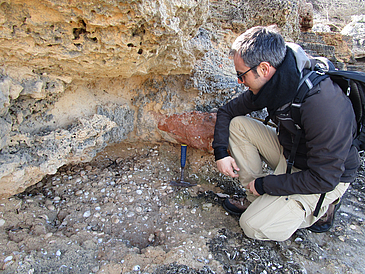In climate research, the last warm period – between 128,000 and 116,000 years ago – is often used as a basis for comparison. This was the last period in the history of the earth in which the climate was warmer than in preindustrial times. The sea level as well as temperatures were higher than today; the ice sheets were smaller. How will temperatures, sea level, and the mass of ice sheets develop in the future? Researchers like Alessio Rovere believe that the answer lies in understanding the conditions of the last warm period – and their significance.
Objective: Better Understanding of Coastal Processes
“For this project, we strive to use a multidisciplinary combination of methods to study the sea level and its fluctuations as well as the extreme waves of the last warm period,” explains Alessio Rovere. He intends to invest this sum in hiring excellent young researchers, creating a reliable global database on the latest interglacial sea levels and wave proxies, and investigating new field surfaces using advanced modelling and measurement techniques.
“The results of this project,” Alessio Rovere says with certainty, “will contribute to a better understanding of coastal processes under somewhat warmer climatic conditions. I am honored that the ERC has considered me for this prestigious award.” He also sees the ERC Starting Grant as a sign of the relevance of his work in recent years.
Since 2014, Rovere has headed the joint research group “Sea Level and Coastal Changes” at the MARUM Center for Marine Environmental Sciences of the University of Bremen and the Leibniz Centre for Tropical Marine Research. The WARMCOASTS project, which is now funded by the European Research Council, is based on the work of this group and is based at the University of Bremen. After completing his studies and earning his doctorate at the University of Genoa in Italy, Alessio Rovere moved first to the Lamont Doherty Earth Observatory at Columbia University in the United States and then to MARUM.
About the ERC Starting Grant
This year, the ERC Starting Grant will be awarded to 403 top young researchers across Europe, and 3,170 applications have been received for the prestigious award. The European Research Council funds the scientists with a total of 603 million euros. The funds are intended to enable them to implement their own research ideas independently with their teams. For a period of five years, groundbreaking frontier research will be funded with a maximum of 1.5 million euros. “The funding by an ERC Starting Grant not only underscores the outstanding expertise of the people awarded, but also the attractive scientific environment of Bremen’s marine sciences,” says Professor Michael Schulz, Director of MARUM. Of the 20 ERC grants awarded to researchers at the University of Bremen since the ERC was established, seven have been awarded to marine scientists.
For Editorial Offices: Pictures for illustration can be downloaded under this link: seafile.zfn.uni-bremen.de/f/71b32a9df87c4217a621/
Contact:
Dr. Alessio Rovere
Tel.: +49 421 218-65771
E-mail: arovere@marum.de
MARUM Press and Public Relations
Ulrike Prange
Tel.: +49 421 218-65540
E-mail: medien@marum.de
About the University of Bremen
Top-performing, diverse, reform-minded, and singularly cooperative – that about sums up the University of Bremen. Around 23,000 people learn, teach, research, and work on its international campus. Their shared goal is to contribute to the advancement of society. With well over 100 degree programs, the range of subjects offered by the University is broad. As one of Europe’s leading research universities, it maintains close cooperation with non-university research institutions in the region. This spirit of cooperation led to the founding of the U Bremen Research Alliance in 2016. The University’s competence and dynamism have also attracted numerous companies to settle in the technology park surrounding the campus. This has created an important national location for innovation – with the University of Bremen at its heart.
www.uni-bremen.de
About the MARUM Center for Marine Environmental Sciences:
MARUM uses state-of-the-art methods and is involved in international projects to decipher the role of the ocean in the earth’s system – especially in view of global change. It records the interactions between geological and biological processes in the sea and contributes to the sustainable use of the oceans. MARUM comprises the DFG Research Center and the Excellence Cluster “The Ocean in the Earth’s System.”
www.marum.de

